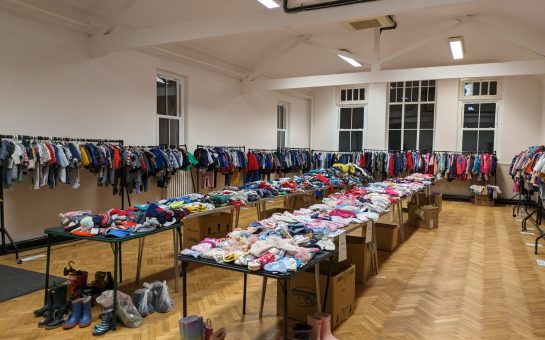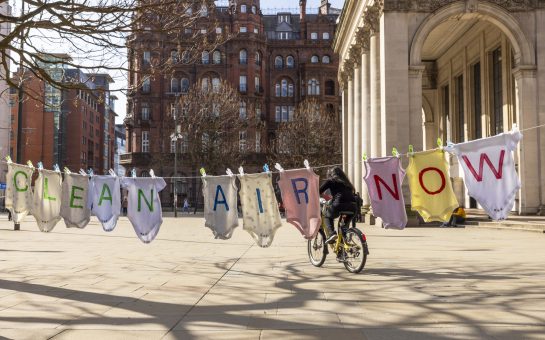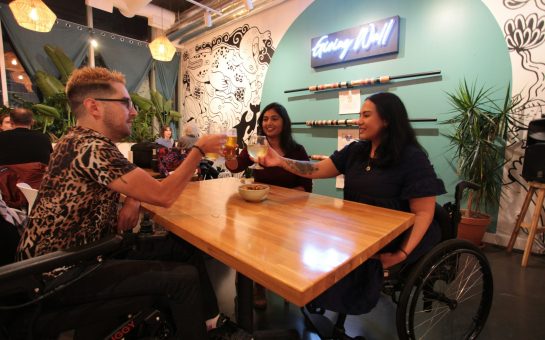Greater Manchester saw a significant spike in religious and racial hate crimes in the wake of the Manchester Arena bombing in May 2017.
Figures obtained from the Greater Manchester Police show that the number of religious hate crimes more than quadrupled between April and May 2017, with the level remaining high throughout June, before plummeting again in July.
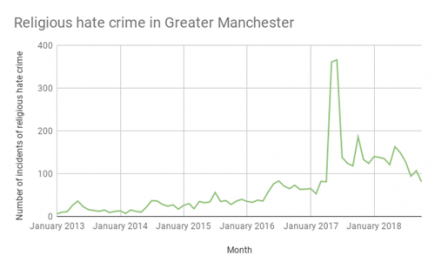
At the same time racially motivated hate crimes almost doubled over the same period, with nearly 900 incidents recorded in June alone across Greater Manchester.
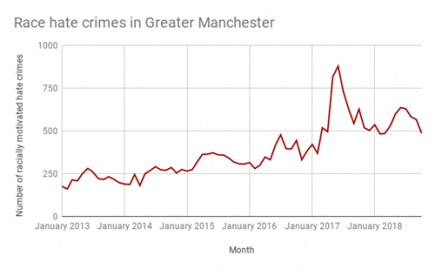
The majority of these crimes took place within the city itself, which saw over a 2300% increase in religious hate crimes, jumping from eight incidents in April 2017 to 199 the following month.
Following the Manchester terror attack, mayor Andy Burnham commissioned a report examining hateful extremism and social cohesion across the region.
The Preventing Hateful Extremism and Promoting Social Cohesion report, published in July 2018, showed a 500% rise in Islamophobic related hate crime in the wake of the bombing, which killed 22 people.
The report also showed that a third of Greater Manchester residents have been victims of racially-motivated hate crimes.
The spike in hate crime following the terror attack at Manchester’s MEN Arena is part of a wider trend nationwide, with hate crimes across the country more than doubled over the last five years, according to the Home Office.
The Home Office document said: “This increase is thought to be largely driven by improvements in police recording, although there has been spikes in hate crime following certain events such as the EU referendum.”
Religious hate crime specifically has also risen 40% over the last two years, something the Home Office attributes to the terror attacks in Westminster, London Bridge, and Manchester.
National advocacy group HOPE not hate produced a report, entitled ‘Fear & HOPE’, in 2017 which documented the rise of anti-Muslim attitudes across the country.
The report shows that attitudes towards Muslims in the UK have worsened overall, with 42% of English people saying that they are more suspicious of Muslims after the terror attacks in London and Manchester.
Greater Manchester has seen hate crimes overall triple in the last five years, with Salford seeing the most incidents outside of Manchester.
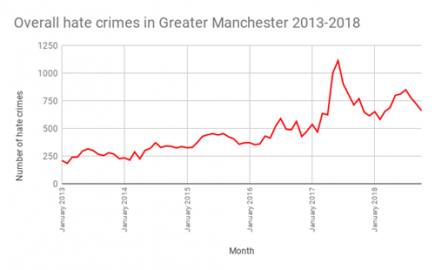
The increases are possibly also linked to growing tensions following the EU referendum and the snap-election in June 2017.
A spokesperson for HOPE not hate said: “The Brexit vote unleashed something toxic within Britain.
“Jo Cox was murdered and then the Islamist-led terror attacks of 2017 threw further fuel on the fire of the public’s already hardening attitudes towards Muslims.
“We’ve also become a more polarised society, split between our increasingly liberal cities and single-industry towns riven by economic pessimism and loss, where attitudes have hardened towards minorities.
“With this febrile mix at play, and the country divided over Brexit, its incumbent on politicians to offer real alternatives to those who feel ‘left behind’ and to wake up to the threat of violence posed by those within an increasingly hardline, if small, far right minority.”
Tell MAMA, an organisation measuring anti-Muslim attacks, noted that the spikes in Islamophobic hate crimes following the EU referendum (475% rise) and the Manchester bombing (700% rise).
A spokesperson for the organisation said: “Across the country, we have seen people and communities reject these hateful divisions by defiantly celebrating our shared values and diversity and showing we will not be intimidated by an intolerant minority.
“Today, more than ever, we need to come together and redouble our efforts against those who seek to divide and play communities off against each other.”
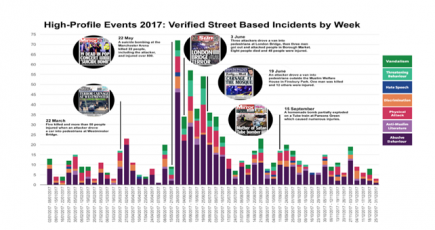
(chart courtesy of Tell MAMA, with thanks)
Main image courtesy of Mikey via Flickr, with thanks.
